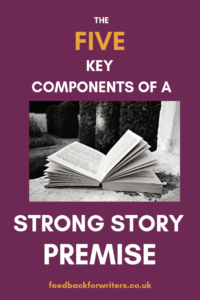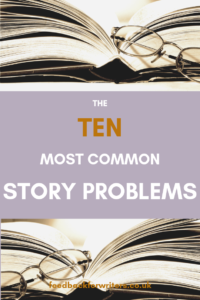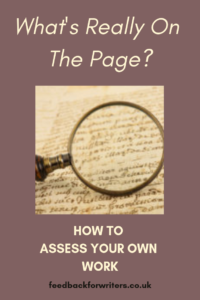Who do you even think you are to say you are a writer?
Herein lies the rub.
So much in a writer’s life can seem to be about confidence and permission. I have had real trouble at times with “lack-of-permissionitis” . This can stem from things like the inevitable rejections, periods of frustration and the odd belittling comment. I know my sense of myself as a writer can certainly plummet as a result. Annoyingly, if this leads to stalling and analysis paralysis, it can end up affecting the work itself – a self-fulfilling prophecy.
So much can seem to rest on others’ judgements and decrees, barriers and rules. Blocks that come from putting all our focus on things outside ourselves can end up being pretty deep-seated.
It’s a common problem, and one that I’m seeing a lot in my writer friends just now. I wanted to share some of the things I personally – through trial and error – have found helpful in ploughing through my most difficult writing times.
Take A Step Back and Take Ownership
For me, this is the key to it all. Ownership of your interests and ideas, your territory, your writing practices and ownership of what works for you in terms of producing your best work and what you know doesn’t.
You are allowed.
Ownership of what the problem, if there is one, feels like to you, and where you think it’s come from. The better you know yourself, the more you can ensure you are giving yourself what it is you need, and discard anything unhelpful. Even if the unhelpful seems to work for someone else.
This may just be a personal quirk of mine, but I’ve often found that it’s the very Things That Everyone Says Are The Surefire Ways To Succeedthat turn out to be the exact things that don’t work for me at all under any circumstances and that flop when I attempt to force myself into using them
As I say, this may just be a feature of my own contrariness, a natural rebelliousness that I turn against myself as a form of self-sabotage. (That’d probably be the official party line.) But I think it should be reframed as self-preservation rather than self-sabotage , When it happens, it may simply be that I’m trying to fit myself in to something, a methodology or rule, that genuinely doesn’t suit me at all. It pays to know yourself.
Don’t Give Up – But Keep Writing. Anything.
It’s perfectly permissible to take a break from a particular writing project if you are getting nowhere. Sometimes a break is exactly what you – and it – needs. Deadlines are great for focusing the mind but they can also induce panic. I often find that ‘resting’ a piece for a couple of weeks rather than ploughing on to try to meet this deadline or that, results, after it’s had a chance to ‘brew’ a bit, in the answers to seemingly insurmountable problems suddenly becoming clear. You can always come back to it (and should try to).
But sometimes it helps to move on for a bit to less pressured writing. More personalized stuff. Journaling, for instance. The things you don’t have to show anybody else, but that could easily end up as the roots of future work. I’m a great fan, for example, of Julia Cameron’s Morning Pages from The Artist’s Way as well as the exercises in her book Right To Write, and if I’m having a ‘bad day’, am sure to work on exercises from the latter.
Develop your own routines
How-to guides and writer seminars can be fantastically helpful for giving you tips and ideas. And it’s always worth finding out what other writers do (e.g. check out the author interviews in the Paris Review). As you’ll discover, writing and art are broad churches. No one method is suitable for everyone, so don’t be afraid to try things out, and to pick and mix. If something doesn’t work for you – ditch it, try something else. I’ve created lots of templates now, for my own use, mixing up methods and ideas I’ve tried from various places. I don’t follow one single methodology; I’ve put together a toolkit for myself of the stuff I’ve personally found works and is useful when I’m faced with particular problems.
Protect your work – don’t share it too early
I do think it’s really important to share your work with others at some stage – whether with a writing group, a trusted like-minded writing friend, an online group or a critique service such as the one I offer here. No matter how good you are at getting distance from and assessing your own writing (and that’s a skill worth learning in itself) there is always additional understanding to be gained from others reading your work from their own perspective. There are things that you just aren’t able to see when it’s your own writing, although of course, you often find that some feedback you get will turn out to be more valuable than others
That said, I think sometimes that writers pressure themselves to share their work too early – first rough drafts in particular – and so don’t always end up receiving feedback that is appropriate to the stage the work is at. A very first draft, for instance, is likely still a seedling; letting others hack at it, going mad for strict editorial rather than big-picture changes, treating it as if it is a hardier later draft that is ready to be gone to town on, may well just kill it dead.
In particular, if you are in a bit of what we could call “ a sensitive period”, I’d highly recommend “caving it” – working by yourself and not sharing at all for a while. Write for yourself only. Go back to experimenting, doing basic exercises, exploring, making your writing art, rather than “a thing of excellence to be consumed by other people”. Make writing fun again – this can often seem to disappear when you are after external approval in some way; the acceptance by an editor, the competition win, the good mark from a tutor in a creative writing class, the awe of your writing group at your brilliance. Often, good art is worth doing for its own sake. That doesn’t mean that you should never share, of course – but let it find its own time, when you – and it – are ready.
Ask for – and make sure you get – the right kind of feedback
This is why I prefer to take a development approach when I’m reading others’ work rather than acting as a gatekeeper, or a teacher with a red pen, saying yes or no. If you want to use a Writer’s Journey analogy (see Christopher Vogler), you’re looking for people in the Friends and Allies camp rather than those standing at the gate, arms folded, doing the whole Threshold Guardian bit, trying to stop others coming through. Think about what you what to know about this piece of writing at this particular stage – and share that with whoever you are asking to read your work. One size does not fit all – try to get feedback tailored that’s useful to where you are at, so you can make the best use of it.
Stop Competing, Start Looking At What Makes Your Work Yours
It’s hard, I know, but – there is room for everyone, honestly. OK, sure, in certain situations, only one person can win first prize, maybe only one will get the award, or the bursary, or the free place on the course. It might be you. It might not. What are you going to do if it isn’t? Seriously – give up? Really? Again, this is another problem associated with focusing too much on narrow measures of external approval. Sure, you might have to work hard to get your work to a good standard; that’s a given. But not everybody writes in the same way or in the same genre and it is not a requirement to do so. Instead of thinking about how everybody else’s work is better than yours, start thinking about how it is different and similar. Think about the other writers you know – what about them? What are the features and peculiarities of their work? What sort of style do they have, what are their common themes and concerns? How do they differ from each other’s and your own? If you had to list some features unique to your work, what would they be?
Above all, you need to look after yourself and protect your writer self and your writing. Nobody ever said it was easy and it can be a tough old world out there.
Don’t, whatever you do, let them get you down.


 I read a lot of draft stories as part of what I do, as well as from being a member of writing groups. What are the most common story problems I see again and again? And when you’re assessing your own work, what should you be looking out for?
I read a lot of draft stories as part of what I do, as well as from being a member of writing groups. What are the most common story problems I see again and again? And when you’re assessing your own work, what should you be looking out for?